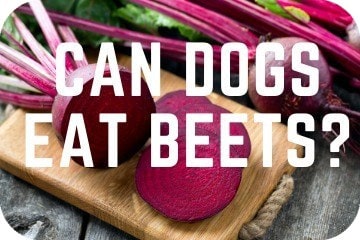
Can Dogs Eat Beets? Yes! However, as with any other food, it should be given in moderation, and your dog closely monitored in case of any allergens. Beets are a great source of fiber, vitamin B9/ folate, manganese, iron, vitamin C, and potassium.
Busy? Get Your Hands Paws On The Answers Quickly…
- Are Beets Good For Dogs?
- What Are The Different Types Of Beets?
- Other Suitable Vegetables and Fruits For Dogs
- FAQs
ARE BEETS GOOD FOR DOGS?
If you’re reading this, you have more than likely asked yourself the question “Can My Dog Eat Beets?”. Well, it has been proven that beets are non-toxic food for dogs and can provide dogs with a considerable amount of nutrients and vitamins. However, if you were to feed your dog this 88% water-based super-food daily, they wouldn’t reap the benefits as us humans would.
If you’re cooking with beets and have some leftovers, by all means, this is a great time to give them to your dog. Incorporating beets into your dog’s daily diet can cause them to become obese as beets are rich in carbohydrates and natural sugars.
Below we have outlined the health benefits and concerns of beets for your dog.
Health Benefits
Vitamin B9 / Folic Acid
This is a necessity in a dog’s diet as it helps to function the brain and intestine properly. A lack of Vitamin B9 / Folic Acid can lead to anemia in dogs. This vitamin is needed most before and during pregnancy. The required amount of folic acid for dogs is relatively low; the recommended allowance for dogs is 0.270mg/kg.
Improved Digestive System
Beets are a great source of fiber. Fiber improves a dog’s digestion and excretion of food. Foods rich in fiber ensure a dog feels full while consuming a low amount of calories, perfect for an overweight dog following a strict dietary program.
Research suggests that dogs need approximately 2.5%-4.5% fiber in their daily diet. One cup of beets provides 3.8g of fiber.
Increased Immunity
Beets provide excellent levels of vitamin C, which helps with your dogs’ immunity; it also helps with the strengthening of their bones and muscles. If your dog has a deficiency of vitamin C, this can cause scurvy. Scurvy causes things such as anemia, urinal bleeding, swollen & discolored gums.
Beets provide 6.7mg of Vitamin C per one cup. Unlike humans, dogs can possess the ability to make their own and, therefore, can live a healthy life without it.
Rich In Iron
Dogs need iron in their diet to help develop their red blood cells. A lack of iron will cause the bone marrow to produce much smaller red blood cells, thus lowering the amount of oxygen intake. A deficiency in iron is known to cause anemia. In worst-case scenarios, anemia will cause your dog to need a blood transfusion.
Beets provide 1.1mg of iron per cup. An average dog’s iron intake will be approximately 80mg/kg of dry matter.
Helps With The Nerve, Muscle and Enzyme Functioning
Beets provide your dogs with proper levels of potassium. Potassium helps with the nerve, muscle, and enzyme function. Hyperkalemia happens in dogs when their potassium levels are lower than usual. Low potassium in dogs can harm their cell structure and eventually affect the organs, which can ultimately be life-threatening if untreated.
Beets provide 442mg of potassium per one cup.
Health Concerns
It is important to note that if you’re feeding your dog beets inconsistently, all of these health concerns will be unrelatable. These health concerns are due to the overconsumption of beets and similar foods.
High In Oxalic Acid
As you’re probably aware, dogs have strong stomachs and can process most foods. However, beets contain something called oxalic acid. Oxalic acid can quickly be processed in small amounts by dogs. However, overconsumption can cause stress to the kidneys, muscular weakness, irregular heart rhythms, and respiratory paralysis (on rare occasions).
Rich In Carbohydrates and Sugars
Beets contain considerably high levels of carbohydrates and natural sugars. If your dog is consuming high levels of these components regularly, they may become obese, which can have adverse effects. To reduce the possibility of this happening, monitor your dog’s diet regularly and only use these types of foods as “one off” treats.
A high carbohydrate diet can cause:
> Dental Problems
> Decreased Metabolism
> Digestive Problems
> Kidney problems/failure.
A high sugar diet can cause:
> Diabetes
> Consistent vomiting & diarrhea
> Internal Inflammation
> Pancreatitis
> Arthritis
Choking Hazard
Raw beets are a potential choking if they’re not cut up small enough for dogs to chew and swallow. Large chunks of raw beets can cause an obstruction in the small intestine, which may lead to surgery. If you’re going to give your dog beets, it is a good idea to boil (soften) them first and then blend or finely chop before serving.
Beets Allergies
On rare occasions, some dogs may be allergic to beets. Just like any other food, their first beets meal should be of a small size. Once consumed, your dog should be closely monitored to see if they show any symptoms of an allergic reaction.
Allergen Symptoms:
> Vomiting
> Consistent Sneezing
> Abdominal Discomfort/Chest Pains
> Watery/Itchy Eyes
> Rashy Skin
If your dog shows any of these signs, your local veterinarian should be called for immediate advice.
WHAT ARE THE DIFFERENT TYPES OF BEETS?
Red Beets
These are the type of beets we relate to when we’re using the term “beets.” If these beets still have their leafy greens attached, they’re likely to be fresh. These beets are best when peeled, roasted, or boiled. They can lose a bit of tenderness when stored, but the sweetness strengthens.
Golden Beets
Golden beets are slightly lighter in color and are less sweet than red beets but also have a less ‘earthy’ flavor to them. Due to the color of golden beets, they are much easier to cook without having a purple mess all over the kitchen!
Chioggia Beets
These beets are naturally striped and look similar to radishes from the outside. These can be cooked just like any other beets, but unfortunately, the candy cane looking effect will disappear once cooked.
Baby Beets
Any type of beets can be sold as a ‘baby beet.’ Baby beets are slightly smaller than ordinary beets. Farmers will pull up the beets earlier than scheduled to make enough space for other beets to grow. Baby beets tend to be softer and juicier than the usual, serve them with their greens for more nutrients!
Canned Beets
These can be very nutritious as they’re canned straight from the farm. If feeding them to your dog, you should check the label for any added ingredients that may cause your dog some harm.
OTHER SUITABLE VEGETABLES AND FRUITS FOR DOGS
Besides from beets, there are plenty of other vegetable options suitable for dogs. Dogs tend to have carnivore diets. However, this does not mean they can’t have vegetables too. Vegetarian food options can provide your dog with plenty of nutrients and help to improve their immune and digestive systems.
Watermelon
Watermelon is 92% water, making it a great refreshing and hydrating treat for dogs. It is low in calories, salt, and fat, as well as containing vitamins A, B6, and C, all of which are essential in a dog’s diet.
Vitamin A
A vitamin A rich diet will help keep your dog’s coat shiny, muscles strong, and good night vision. Other foods rich in vitamin A include cod liver oil, beef liver, sweet potato, and carrots.
Vitamin B6
This vitamin aids with controlling hormones specifically for thyroid-related issues. Sufficient B6 helps with heart health, weight regulation, and water regulation. Other foods with high B6 levels include eggs, fish, turkey, chicken, and wholegrain rice.
Vitamin C
Several studies have shown that dogs with a sufficient level of vitamin C are better at fighting disease and illnesses. Stress and exhaustion can cause a depletion in vitamin C. Other foods rich in vitamin C include broccoli, spinach, potatoes, and Brussels sprouts.
Calories
This fruit is low in calories and a great refreshing snack for dogs. Watermelon has around 50 calories per cup. Dogs should not consume more than 10% of their calorie intake in treats. So if your dog’s daily calorie intake should be 250 calories, they can safely have 1/2 cup of watermelon as a healthy treat.
Sugar
Watermelon does have high sugar content, and although this is natural sugar (fructose), it is still recommended to eat in moderation.
If your dog does have diabetes or any other condition which could be affected by their sugar intake, make sure to consult a vet before feeding. Alternative low sugar treats, such as vegetables, could be a great alternative.
Fiber
Fiber isn’t a necessity in a dog’s diet and isn’t something ‘wild’ dogs would have eaten. However, it can help with the gut, digestive system, and to keep consistent bowel movements.
Broccoli
Broccoli is an excellent source of nutrients for both dogs and humans. It provides us with vast amounts of protein but at the same time has low levels of fat, carbohydrates, and sugar. Broccoli also provides dogs & humans with vitamins A, B-6, and C as well as iron and calcium.
Vitamin A
Incorporating vitamin A into a dog’s diet will help maintain your dogs’ shiny coat, muscle strength, and visibility through the night. Broccoli provides 12% of vitamin A towards your dogs’ daily recommendation (22 to 47 IU per KG of dogs weight). Other food that includes vitamin A are; carrots, spinach, and cooked sweet potatoes.
Vitamin B6
This helps dogs to control their hormones, specifically those related to thyroid issues. Moderate consumption levels of B6 helps dogs with regulating their weight and water levels as well as helping to maintain a healthy heart. Other foods that provide significant levels of B6 include; fish, turkey, chicken, and wholegrain rice.
Calories
Broccoli is a great treat for your dog, as it is very low in calories (34). The usual treats most owners buy from pet stores can be high in fat and calories. Therefore, this reduces the number of recommended treats your dog should have each day. If you replace these with broccoli treats, you can increase the number of treats or portions however they shouldn’t feel the need to eat more
Sugar
Just like most vegetables, broccoli has quite a low level of sugar. This is key; providing dogs with sugary foods can have serious implications. If you feel your dog has diabetes or a sugar-related illness, it’s advisable to seek assistance from a local vet regarding your dogs’ dietary requirements.
Fiber
Monitoring your dogs’ fiber intake isn’t a necessity. However, moderate levels of fiber have shown to help with a dog’s digestive system.
Zucchini
Zucchini chunks or bites can be an excellent replacement for dog treats that are high in calories, especially during the puppy training stage, where treats are non-stop! As described above, zucchini has high levels of fiber, which provides your dog with the ideal nutrients it needs. Zucchini also helps with your dogs’ digestive system and has been known to reduce or limit any cholesterol problems that may occur. Zucchini is full of potassium, folate, and Vitamin A, which is a necessity for keeping muscles hydrated and healthy.
Lettuce
It may not be the most nutritionally dense vegetable around, but lettuce is an excellent addition to any salad bowl. But this low-calorie snack can be enjoyed by more than just humans. Our furry friends seem to enjoy the occasional piece too, and considering it can be up to 96% water content, it is also great for staying hydrated.
It also contains:
Vitamin C – Great for fighting allergies and allergic reactions and boosting the immune system.
Vitamin A – Promotes healthy growth and immune function.
Calcium – Supports bone, teeth, and muscle health.
Potassium – Helps in organ function and regulating the internal pH levels.
Fiber – Aids in digestive health.
How do you cook beets for dogs?
Just like you’d cook them for yourself. Scrub and rinse the beets to ensure any dirt is washed off. Once they’re clean, peel and slice them into small edible chunks, suitable for your dog. They can now be baked or boiled; whichever is your preference. They can be served raw, but this is not recommended due to the possibility of your dog choking.
Is cheese bad for dogs?
Whilst cheese isn’t toxic or poisonous for dogs, and it can cause other issues if eaten on a regular basis. Cheese can be a great treat and works very well when trying to train your pup, however it should be given in moderation. Due to the high-fat content, cheese shouldn’t be given to your dog on a regular basis, as this will increase their chances of becoming obese.
Is peanut butter good for dogs?
It’s not ‘good’ as such but can be given to your dog. However, some peanut butter contains xylitol, which is toxic to dogs. Therefore when purchasing peanut butter for your dog, you should check the labels and ensure your product is xylitol free. Peanut butter works as a great treat and can also go inside a kong, which is a fun, enjoyable, and stimulating game. For more information on peanut butter, read our article “Can Dogs Eat Peanut Butter?”.
Can dogs have almond milk?
Almond milk is made from processed almonds. Therefore, it is suitable for your dog to drink almond milk. However, there are some precautions you need to take before serving. For more information on these, read our article “Can Puppies Drink Milk?”.
Looking for more pawsome posts? Check these out…
Can Dogs Eat Lettuce?
How To Make A Snuffle Mat
When Do Puppies Lose Their Teeth?
Can Dogs Eat Peanut Butter?
Can Dogs Get Coronavirus (COVID-19)?
Disclaimer: Each dog is different, and every circumstance is different. All efforts have been made to provide accurate information. However, it is not provided by a qualified Veterinarian, Veterinarian Surgeon, or Behaviorist. The information provided is purely educational. The information should not be used as an alternative or substitute for medical care. If you have any health or medical concerns, contact a qualified Veterinary Surgeon or Veterinarian immediately.










No Comment! Be the first one.